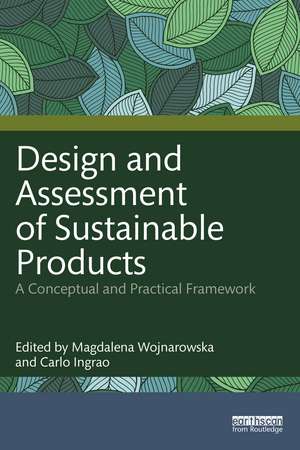Design and Assessment of Sustainable Products: A Conceptual and Practical Framework
Editat de Magdalena Wojnarowska, Carlo Ingraoen Limba Engleză Paperback – 30 dec 2024
This edited collection introduces a new set of methods and tools aligned with the concept of comprehensive sustainable produce design that integrates the environmental and social benefits of a product in line with the principles of a circular economy. It provides a comprehensive understanding of the theoretical and practical framework that underpins a sustainable product, highlighting the multiple key roles of (eco-)design, innovation, quality, and sustainability. The authors describe the criteria for which products can be defined as being sustainable, and outline how different manufacturing technologies influence the value of those products and the place they can find on the market accordingly. The book's significant contribution lies in identifying the critical factors that are needed to successfully implement the framework throughout the entire life cycle of the product in a holistic integrated approach.
This book will be of interest for researchers and students studying sustainable product design, environmental studies, engineering, and sustainable business management. It will also be a useful resource for representatives of the business community, managers, technicians, decision-makers, and consumers interested in sustainable product design issues.
| Toate formatele și edițiile | Preț | Express |
|---|---|---|
| Paperback (1) | 288.20 lei 22-36 zile | +20.43 lei 6-12 zile |
| Taylor & Francis – 30 dec 2024 | 288.20 lei 22-36 zile | +20.43 lei 6-12 zile |
| Hardback (1) | 1004.24 lei 43-57 zile | |
| Taylor & Francis – 30 dec 2024 | 1004.24 lei 43-57 zile |
Preț: 288.20 lei
Nou
Puncte Express: 432
Preț estimativ în valută:
55.16€ • 59.94$ • 46.37£
55.16€ • 59.94$ • 46.37£
Carte disponibilă
Livrare economică 31 martie-14 aprilie
Livrare express 15-21 martie pentru 30.42 lei
Preluare comenzi: 021 569.72.76
Specificații
ISBN-13: 9781032710679
ISBN-10: 1032710675
Pagini: 278
Ilustrații: 68
Dimensiuni: 156 x 234 x 18 mm
Greutate: 0.4 kg
Ediția:1
Editura: Taylor & Francis
Colecția Routledge
Locul publicării:Oxford, United Kingdom
ISBN-10: 1032710675
Pagini: 278
Ilustrații: 68
Dimensiuni: 156 x 234 x 18 mm
Greutate: 0.4 kg
Ediția:1
Editura: Taylor & Francis
Colecția Routledge
Locul publicării:Oxford, United Kingdom
Public țintă
Postgraduate, Professional Practice & Development, Professional Reference, Undergraduate Advanced, and Undergraduate CoreCuprins
1. The sustainable transformation of enterprises 2. Product transformation: From conventional to sustainable products 3. Designing and developing sustainable products 4. The role of life cycle assessment in the design and development of sustainable products 5. Sustainable production 6. A sustainable supply chain 7. Digitalisation in sustainable products and sustainable production 8. Waste management in sustainable development 9. The role of Corporate Social Responsibility for sustainability of products 10. Marketing sustainable products 11. Sustainable consumption of products 12. Sustainable product innovation: Biopolymers as a case study 13. The Life Cycle Assessment of biopolymer as an example of a sustainable product 14. Cost-benefit analysis in the biopolymer lifecycle
Notă biografică
Magdalena Wojnarowska is Associate Professor, Head of Department of Technology and Ecology of Products at the Cracow University of Economics, Poland. She is manager and contractor of research projects financed from the funds of the Minister of Science and Higher Education, The National Science Centre, The National Centre for Research and Development and The European H2020. Magdalena is an expert in the selection of projects for co-financing from EU funds in the field of environmental protection. She is a representative of the University of Economics in Krakow at KT 270 for Environmental Management of the Polish Committee for Standardization and also in the LifeScience Cluster. She is the author of numerous publications in the field of circular economy, sustainable production and sustainable consumption, LCA, eco-design, and her research focuses on the areas of circular economy, bioeconomy, environmental management tools, sustainable production and sustainable consumption.
Carlo Ingrao is a tenure-track assistant professor with associate professorship habilitation in ‘Commodity Science’, at the Department of Economics, Management and Business Law of University of Bari Aldo Moro, Italy. He obtained a M.Sc. degree in ‘Engineering for the Environment and the Territory’ at the University of Catania, and has twice been awarded the title of PhD: in ‘Geotechnical Engineering’ at University of Catania, and in ‘Civil Infrastructures for the Territory’ at the Kore University of Enna. Ranked in the 2022 top-2% list of the world's most cited and influential researchers for the year 2021, his main research activities and interests are focussed on sustainability, circular economy, and life cycle assessment applications in a wide range of sectors. Within those themes, he has authored around ninety publications in indexed international journals, book chapters, and conference proceedings, has taught university courses, and has given lots of lectures and seminars.
Carlo Ingrao is a tenure-track assistant professor with associate professorship habilitation in ‘Commodity Science’, at the Department of Economics, Management and Business Law of University of Bari Aldo Moro, Italy. He obtained a M.Sc. degree in ‘Engineering for the Environment and the Territory’ at the University of Catania, and has twice been awarded the title of PhD: in ‘Geotechnical Engineering’ at University of Catania, and in ‘Civil Infrastructures for the Territory’ at the Kore University of Enna. Ranked in the 2022 top-2% list of the world's most cited and influential researchers for the year 2021, his main research activities and interests are focussed on sustainability, circular economy, and life cycle assessment applications in a wide range of sectors. Within those themes, he has authored around ninety publications in indexed international journals, book chapters, and conference proceedings, has taught university courses, and has given lots of lectures and seminars.
Descriere
This book questions the definition of what makes a product sustainable and argues that a holistic approach to sustainable product design is required. For researchers and students of sustainable product design, environmental studies, engineering, and sustainable business management, and also representatives of the business community.
